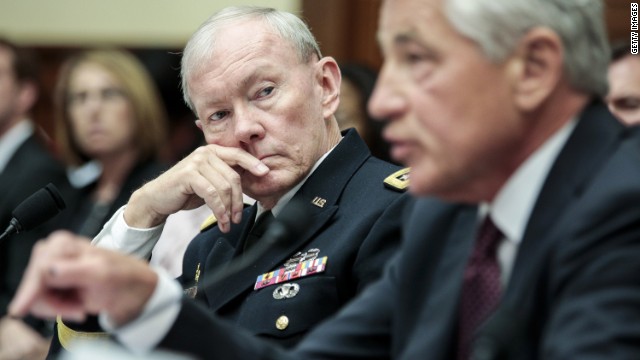
Chairman of the Joint Chiefs of Staff Gen. Martin Dempsey (L) listens as Defense Secretary Chuck Hagel testifies before the House Armed Services Committee Thursday
Mistake in classification led to N. Korea info being revealed
By Jamie Crawford, with reporting from Pam Benson, Deirdre Walsh, Chris Lawrence and Barbara Starr
The Pentagon was caught by surprise Thursday when sensitive information about North Korea's nuclear program from a classified March 2013 report was "mistakenly" declassified and discussed during an open hearing on Capitol Hill, raising questions about how such a significant error could have occurred.
In a hearing by the House Armed Services Committee to discuss the Pentagon's budget, Rep. David Lamborn, R-Colorado, read from what he said was an unclassified sentence in an otherwise classified report by the Defense Intelligence Agency (DIA).
"DIA assess with moderate confidence the North currently has nuclear weapons capable of delivery by ballistic missiles, however, the reliability will be low," Lamborn read before posing a question about its significance to Joint Chiefs Chairman Gen. Martin Dempsey.
"Well, I haven't seen it," Dempsey said in response, appearing caught off guard. "And you said it's not publicly released, so I - I choose not to comment on it."
"Well, I haven't seen it," Dempsey said in response, appearing caught off guard. "And you said it's not publicly released, so I - I choose not to comment on it."
Multiple officials told CNN after the hearing that the information read by Lamborn was "mistakenly" marked as unclassified.
"Several of us here in the Pentagon were shocked by hearing that assessment read aloud in an open hearing," one defense official told CNN.
The line came from a seven-page report, "Dynamic Threat Assessment 8099: North Korea Nuclear Weapons Program."
"The only thing DIA has unclassified is that one sentence and the title," Lamborn said later Thursday in an interview with CNN. "This is not briefing reports supplied to the committee, this is simply a DIA analysis, a seven-page report in which one sentence is unclassified."
An aide to the committee confirmed to CNN that Lamborn received the material from committee staff before the hearing.
"We were very careful and checked with DIA. to confirm that was an unclassified section before beginning any kind of conversation within an open setting about it," the aide said. "We checked to make sure it was not something that was mistakenly declassified."
"We double and triple-checked to make sure that what was divulged in an open forum was declassified," Lamborn said Thursday night in an interview on CNN's Anderson Cooper 360.
The scenario that played out raised the question of how it could have even occurred in the first place.
"Classification decisions are more of an art than a science," a government official familiar with those procedures told CNN.
While certain paragraphs within a report may be classified at different levels to protect the revelation of certain sources and methods, the official said it was unusual to have one sentence in a report declassified.
Such a decision would most likely come from the head of the agency that published the report, or a more senior official such as the director of national intelligence, who is charged with overseeing the entire intelligence community.
A congressional source told CNN there is a layered approach to classification with the level of classification indicated on each paragraph.
While certain paragraphs within reports are occasionally declassified, the source said it is highly unusual for a conclusion, such as the assessment read by Lamborn, to be declassified.
While questions as to how the statement was ultimately declassified are certain to mount within the intelligence community, the Pentagon played down the gravity of the assessment on Thursday evening.
"While I cannot speak to all the details of a report that is classified in its entirety, it would be inaccurate to suggest that the North Korean regime has fully tested, developed, or demonstrated the kinds of nuclear capabilities referenced in the passage," Pentagon spokesman George Little said in a written statement.
"The United States continues to closely monitor the North Korean nuclear program and calls upon North Korea to honor its international obligations," he added.
No comments:
Post a Comment